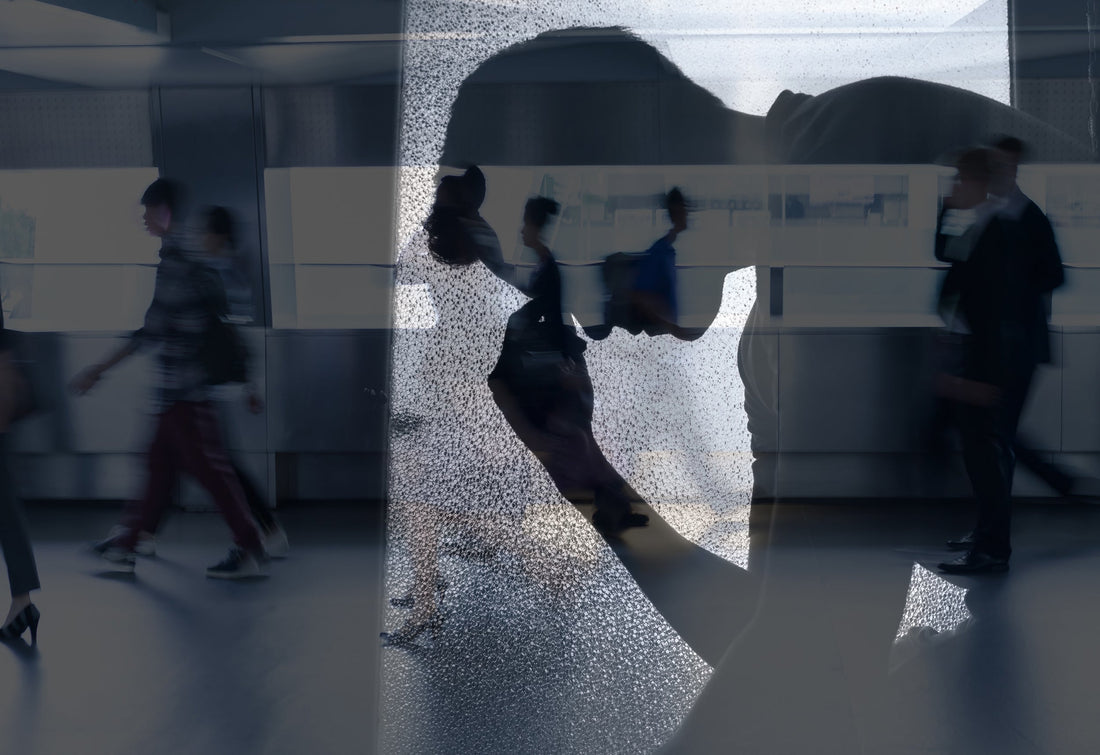
IBS and Social Anxiety: Breaking the Cycle of Digestive Embarrassment and Reclaiming Your Social Life
Share
Picture this: You're invited to your best friend's birthday dinner at that trendy new restaurant downtown. Instead of excitement, your stomach immediately knots with dread. Not because of the social pressure or gift anxiety, but because your mind instantly calculates bathroom locations, menu dangers, and escape routes. Sound familiar? You're not alone in this exhausting dance between your digestive system and your social calendar.
For millions of people living with Irritable Bowel Syndrome (IBS), social situations become obstacle courses of potential embarrassment. The unpredictable nature of digestive symptoms creates a perfect storm: physical discomfort triggers social anxiety, which in turn worsens digestive symptoms, creating a downward spiral that can leave you feeling stuck in your own body.
But here's the thing about cycles—they can be broken. While IBS might be a chronic condition, the social isolation it creates doesn't have to be permanent. This isn't about finding a miracle cure or pretending your symptoms don't exist. It's about developing go-to strategies, mindset shifts, and practical solutions that put you back in the driver's seat of your social life.
The Hidden Connection: How IBS and Social Anxiety Feed Each Other
Your gut and brain communicate constantly through the gut-brain axis—a network of nerves, hormones, and immune signals. This explains why you get butterflies before presentations and why digestive issues trigger intense anxiety.
With IBS, this communication becomes hyperactive. Your intestines send distress signals that your brain interprets as social threats, flooding your system with stress hormones. Unfortunately, these same hormones worsen IBS symptoms, creating a self-reinforcing pattern.
Social anxiety around digestive issues carries a unique fear: public embarrassment. The thought of experiencing symptoms in front of others—urgent bathroom needs, stomach sounds, or gas—can trigger anticipatory anxiety that's worse than the symptoms themselves.
This creates "fear-based learning" where your brain associates social situations with digestive disasters. Eventually, just thinking about social events can trigger physical symptoms, reinforcing the belief that you're vulnerable in social spaces.
Here's the catch: The stress response meant to protect you actually makes your digestive system more reactive, while social isolation increases overall stress, perpetuating the pattern.
Understanding this connection is the first step toward breaking free. When you recognize that your social anxiety and digestive symptoms are interconnected, you can address both simultaneously rather than treating them as separate issues.
The Anatomy of Digestive Embarrassment
Digestive embarrassment hits from all angles, creating a toxic mix of shame and anxiety. It taps into our deepest need to belong while bumping up against society's unspoken rules about bodily functions—things that are perfectly normal yet treated as unspeakable.
The trigger situations are as varied as they are common. Restaurant meals become exercises in menu analysis and bathroom mapping. Movie theaters pose the double threat of being trapped in a dark row and the mortifying possibility of audible symptoms during quiet scenes. Work meetings transform into endurance tests where concentration splits between professional performance and internal monitoring of digestive signals.
But perhaps the most insidious aspect is anticipatory anxiety—the way your mind time-travels to imagine worst-case scenarios. You might spend hours before an event catastrophizing about potential symptoms, mentally rehearsing embarrassing situations that may never occur. This mental rehearsal actually increases the likelihood of symptoms through the stress response, creating a self-fulfilling prophecy.
Social isolation becomes both a coping mechanism and a trap. It starts small—declining one dinner invitation, leaving a party early, avoiding foods you love. But each avoidance behavior reinforces the belief that social situations are dangerous, gradually shrinking your comfort zone until it feels safer to stay home than risk embarrassment.
The all-or-nothing mindset compounds this isolation. Many people with IBS develop unrealistic standards for symptom control, believing they need to achieve perfect digestive predictability before rejoining social activities. This thinking ignores the reality that symptom management is often about progress, not perfection.

Breaking Point: When Your Gut Controls Your Calendar
There comes a moment when you realize your digestive system has become the CEO of your social life, making executive decisions about where you can go, what you can eat, and who you can see. Career opportunities slip away when networking events feel too risky. Romantic relationships suffer when dinner dates trigger more anxiety than excitement. Family gatherings become sources of stress rather than connection.
The mental energy required to constantly monitor digestive symptoms is exhausting. You become hypervigilant about every sensation, constantly scanning for signs of potential issues. This hypervigilance steals attention from conversations and relationships, leaving you physically present but mentally consumed by internal monitoring.
Perhaps most heartbreaking is the slow erosion of identity. The person who used to love trying new restaurants becomes someone who only eats at home. The social butterfly transforms into a homebody, not by choice but by fear. This breaking point, while painful, often serves as a catalyst for change—the recognition that avoidance has become more problematic than the original symptoms.

Rewiring Your Response: Mental Strategies That Work
Breaking the cycle requires rewiring how your brain processes digestive sensations and social situations. Start with cognitive reframing—viewing stomach sensations as information rather than catastrophic threats. A rumbling stomach becomes data about hunger, not a warning about social disaster.
Remember the spotlight effect: you notice your symptoms far more than others do. Most people are too preoccupied with their own concerns to analyze your bathroom habits or stomach sounds.
Mindfulness techniques keep you grounded in the present rather than lost in worst-case future scenarios. Breathing exercises activate your calm response and can be used anywhere without drawing attention. The key is practice: these techniques work best when they become automatic responses rather than panic-driven afterthoughts.
Acceptance doesn't mean resignation; it means acknowledging that symptoms might occur while taking practical steps to manage them. Resisting digestive symptoms often intensifies them through increased stress.

Confidence Through Protection: The Shreddies Solution
One of the most anxiety-provoking aspects of living with IBS is the fear of flatulence in social situations. This fear can be so overwhelming that it keeps people homebound, declining invitations and missing out on meaningful connections. But what if there was a way to address this specific concern with confidence and discretion?
Shreddies USA has developed an innovative solution that directly tackles one of the most embarrassing aspects of digestive conditions. Their activated carbon filtering IBS underwear uses advanced odor-filtering technology to neutralize flatulence odors, providing a discrete layer of protection that can transform your approach to social situations.
The psychological impact of having this protection cannot be overstated. When you know you're wearing Shreddies' odor-filtering underwear, the constant mental calculation of "what if" scenarios diminishes significantly. You can focus on conversations instead of internal monitoring. You can laugh genuinely without tensing up. You can sit comfortably in meetings without positioning yourself strategically near exits.
The activated carbon cloth technology works continuously and invisibly, filtering odors before they become noticeable to others. This isn't about masking the problem—it's about providing genuine protection that allows you to engage authentically in social situations. The underwear looks and feels like regular undergarments, ensuring your confidence boost remains completely private.
For many people with IBS, knowing they have this extra layer of protection becomes the catalyst for re-engaging with social activities. It's the difference between declining a dinner invitation and accepting it with enthusiasm. It's the confidence to take that new job that requires client meetings. It's the freedom to focus on building relationships instead of managing embarrassment.
The beauty of the Shreddies solution lies in its simplicity and effectiveness. While you're working on the mental strategies and lifestyle approaches that address the root causes of social anxiety around IBS, having reliable protection for one of your biggest concerns provides the breathing room needed to rebuild your social confidence gradually and sustainably.
SHOP SHREDDIES UNDERWEAR FOR IBS

Your Go-To Strategies: Lifestyle Approaches for Confidence
While innovative protection like Shreddies provides crucial confidence support, developing comprehensive lifestyle strategies creates a foundation for long-term social re-engagement. Think of these as your confidence toolkit—approaches that allow you to participate authentically while managing your condition effectively.
Dietary planning becomes an art form rather than a restriction when approached strategically. The goal isn't to eliminate all potentially problematic foods forever, but to understand your personal triggers and make informed choices based on the social situation. High-stakes events might call for conservative food choices, while casual gatherings with close friends might allow for more culinary adventure.
Timing strategies can dramatically reduce symptom anxiety. Eat your main meal earlier in the day before evening events, and follow the two-hour rule—avoiding large meals within two hours of social activities.
Stay consistently hydrated throughout the day, but reduce intake an hour before events to avoid urgent bathroom needs. Emergency kits provide psychological security: pack digestive aids, wet wipes, and a change of underwear. Simply knowing you're prepared often prevents worst-case scenarios.
Smart preparation includes reviewing restaurant menus online, using bathroom location apps, and keeping trigger food notes on your phone. Choose darker, looser-fitting clothes with layers for comfort adjustments.
Preparation rituals create a sense of control and readiness. This might include specific breathing exercises, positive affirmations, or physical preparation routines. The key is consistency—having the same preparation ritual signals to your brain that you're ready to handle whatever comes.
Social Situations: Your Action Plan
Equipped with mental strategies, protective solutions like Shreddies, and practical lifestyle approaches, you're ready to develop specific action plans for different social scenarios. The key is starting small and building confidence gradually rather than jumping into the most challenging situations first.
Restaurant navigation begins with research—review menus online and choose familiar places for high-stakes events. During meals, pace yourself deliberately and don't feel obligated to clean your plate. Use bathroom breaks for breathing exercises and reset if needed.
Work events require strategic positioning near exits and bringing safe snacks to avoid problematic catered food. For family gatherings, communicate briefly with one trusted member who can deflect food pressure, and offer to bring a dish you can tolerate.
Early dating works better with non-food activities—coffee, walks, museums. As relationships develop, honest communication about dietary needs usually strengthens connections rather than weakening them.
Travel demands extra preparation: research bathroom locations, pack familiar foods and medications in carry-on luggage, and build buffer time into schedules without creating additional pressure.
Recovery planning is as important as event preparation. After challenging social situations, practice self-compassion regardless of how symptoms manifested. Analyze what worked well and what you might adjust for next time, but avoid harsh self-criticism that undermines future confidence.
Frequently Asked Questions
Q: How long does it take to break the cycle of IBS and social anxiety?
A: Recovery timelines vary significantly based on individual factors like symptom severity, anxiety levels, and consistency with management strategies. Many people notice improvements in confidence within weeks of implementing practical tools, while deeper anxiety patterns might take months to fully address. The key is celebrating small progress rather than expecting linear improvement.
Q: Can social anxiety actually make IBS symptoms worse?
A: Absolutely. The gut-brain connection means that stress and anxiety directly impact digestive function through hormonal and neural pathways. Managing anxiety often leads to noticeable improvements in digestive symptoms, making mental health strategies as important as dietary management.
Q: Should I tell friends and coworkers about my IBS?
A: Disclosure is a personal choice that depends on your comfort level and the specific relationship. Brief, factual explanations about dietary needs are often sufficient for most social situations. Close friends and family usually benefit from more detailed understanding, while casual acquaintances rarely need extensive explanations.
Q: What if I have symptoms during an important event?
A: Having a specific action plan reduces anxiety about this possibility. Practice calm self-talk, use bathroom breaks for breathing exercises and reset, and remember that most people are far less aware of your symptoms than you imagine. Preparation and self-compassion are your best go-to strategies. For added confidence, some people find that discreet protective products like Shreddies USA's odor-filtering underwear provide extra peace of mind during high-stakes social situations.
Q: Are there foods that universally trigger IBS symptoms?
A: While common triggers include high-fat foods, caffeine, alcohol, and certain types of fiber, IBS triggers are highly individual. Food diaries help identify personal patterns, but what affects one person might be perfectly fine for another.
Q: How do I handle food pressure at social events?
A: Prepare simple explanations like "I'm being careful about what I eat right now" or "I have some dietary restrictions." Offering to bring a dish you can enjoy ensures safe options. Remember that true friends care more about your presence than your plate participation.
Q: Can exercise help with both IBS and social anxiety?
A: Regular moderate exercise benefits both conditions by reducing stress hormones, improving digestion, and boosting mood-regulating neurotransmitters. Gentle activities like walking, yoga, or swimming are often well-tolerated and provide mental health benefits alongside physical improvements.
Q: When should I seek professional help?
A: Consider professional support if symptoms significantly impact your quality of life, if avoidance behaviors are increasing, or if you're experiencing depression alongside your digestive and social concerns. Both medical and mental health professionals can provide valuable tools for comprehensive management.
Disclaimer: This content is for informational purposes only and is not intended to replace professional medical advice, diagnosis, or treatment. Always consult with qualified healthcare providers regarding any questions about medical conditions, digestive symptoms, or mental health concerns. Individual experiences with IBS and anxiety vary significantly, and what works for one person may not be appropriate for another.



